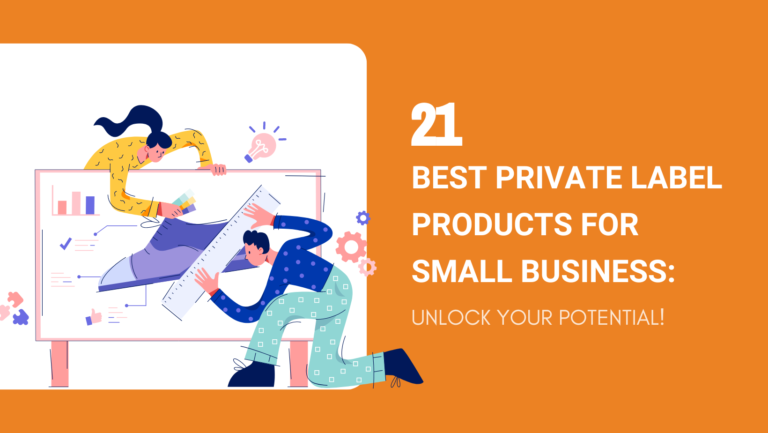Exploring the potential of private label products can be a game-changer for your small business. By choosing private labeling, you gain control over your branding, which aligns perfectly with your brand identity and provides higher profit margins.
Private-label products allow you to differentiate yourself from competitors and build a loyal customer base.
In this article, you’ll discover a comprehensive list of top private-label products. These options present lucrative opportunities to create a private label brand that stands out in the market.
You’ll also find essential insights on the advantages and pitfalls of private labeling, along with practical tips to ensure your products are of high quality and resonate with your target audience.
Key Takeaways
- Private label products, such as skincare, fitness supplements, and eco-friendly items, provide higher profit margins and unique branding opportunities for small businesses.
- Success in private labeling depends on careful product selection, quality control, and strategic branding, with a focus on customization and consumer trends.
- Understanding the pros and cons of private labeling, including initial investment and supplier dependence, is crucial for building a profitable and sustainable business.
What Is a Private-Label Product?
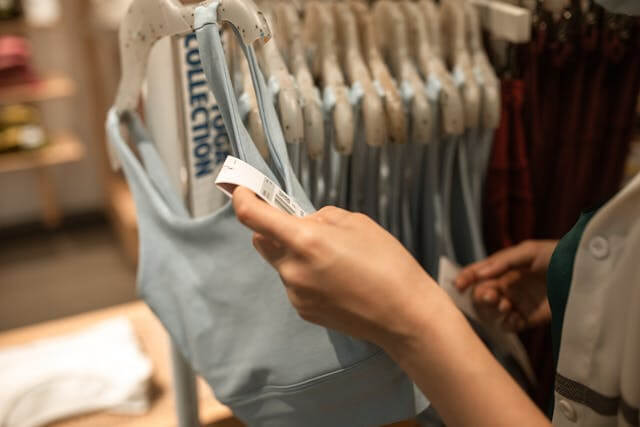
Private-label products are items that a manufacturer produces but sells under a retailer’s brand. This model allows you to offer unique products without setting up manufacturing processes yourself.
You partner with a product sourcing service to select items. The manufacturer then customizes and brands these products under your label.
The Difference between White Label and Private Label
Private label products are specific to your brand, giving you control over the design, packaging, and branding.
In contrast, white label products are generic items sold to multiple retailers who then rebrand them. This results in less customization compared to private-label items, as the products are not uniquely tailored to one brand.
The Pros and Cons of Selling Private-Label Products
Pros of Selling Private-Label Products
Selling private-label products offers the advantages of complete control over branding, higher profit margins, and increased customer loyalty. These benefits can significantly boost your business’s growth and sustainability.
Control Over Branding
With private labeling, you have the power to design a unique brand identity. This includes crafting custom packaging and labeling that reflect your brand’s values and vision.
For instance, you can select specific colors, logos, and taglines that resonate with your target audience. This level of control allows you to differentiate your products from competitors effectively.
Moreover, aligning your marketing strategy with your branding ensures consistency across all platforms. Tailoring every aspect of your product presentation can create a memorable brand experience for customers.
Higher Profit Margins
Private-label products often yield higher profit margins compared to reselling national brands. By manufacturing your own products, you can negotiate better rates and skirt around the additional costs associated with third-party brands.
This enables you to set competitive prices that maximize your profitability.
For example, small business owners can initially invest around $500 to source and brand their products. Bulk purchasing reduces per-unit costs, leading to better margins.
With fewer companies competing under the same branding, you enjoy a more favorable market position, enabling you to attract more customers and retain higher profits.
Customer Loyalty

Building customer loyalty is another crucial benefit of private labeling. When customers purchase a consistently branded product, they begin to associate quality and reliability with your brand.
This fosters trust and encourages repeat business. Consistent branding and high-quality standards play pivotal roles in securing customer loyalty.
Investing in quality control ensures that every item meets your brand’s standards. Happy customers are more likely to return, driving long-term business success.
Utilizing product branding services can help solidify your brand’s market presence and foster lasting customer relationships.
Cons of Selling Private-Label Products
Selling private-label products can be challenging due to the high initial investment, maintaining quality control, and the constraints of minimum order quantities (MOQ). Each factor can significantly impact your business strategy.
Initial Investment
One of the primary challenges is the substantial upfront costs involved. Developing and producing private-label products requires funding for product design, packaging, and marketing.
Custom packaging, for instance, can be expensive, especially when sourced from international suppliers.
Creating an effective marketing strategy to promote your private label branding is also essential. You’ll need to budget for advertising, photography, and possibly influencer partnerships.
Investing in unique branding is also crucial to differentiate your products in a competitive market. These investments are vital, but they also require a strong financial plan to avoid straining your resources.
Quality Control
Maintaining consistent quality control presents another significant challenge. As you rely on third-party manufacturers to produce your products, ensuring each item meets your standards is crucial.
This requires rigorous testing and supplier vetting, which can be time-consuming and costly.
Issues like delayed shipments, product defects, or variations in quality can damage your brand’s reputation. To mitigate these risks, it’s important to develop strong relationships with reliable suppliers.
You might consider using product sourcing services to help identify and vet manufacturers. Regular inspections and quality audits are essential to maintain high standards and build customer trust.
Minimum Order Quantities (MOQ)

Minimum Order Quantities (MOQ) can be a barrier for small businesses, especially those with limited budgets. Many manufacturers require large orders to justify production costs, making it difficult for smaller enterprises to meet these demands.
High MOQs can lead to excessive inventory costs, storage issues, and potential cash flow problems. One strategy to manage this is negotiating lower MOQs with suppliers or finding manufacturers who cater to small businesses.
In some cases, starting with smaller orders may be feasible, allowing you to test the market without a significant financial commitment.
Understanding supplier policies and negotiation tips can help you navigate these challenges effectively without overextending your budget.
A List of Private Label Products for Small Business
Below is a selection of private label products suitable for small businesses. These products can be customized to match your brand’s identity and should adhere to high-quality standards.
1. Skincare Products
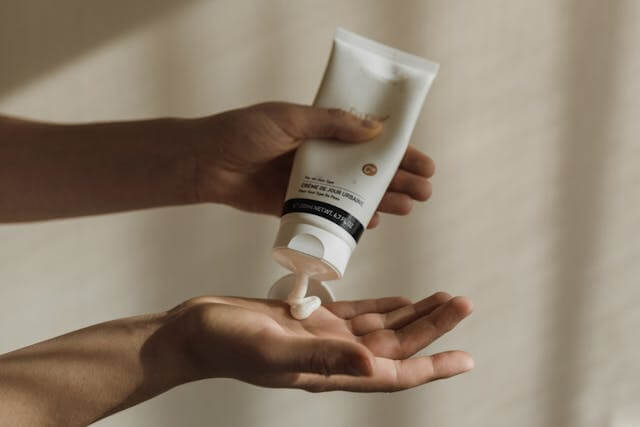
Skincare products are among the top choices for private labeling due to the high demand and diverse range of products available. From moisturizers to serums, small businesses can find profitable opportunities in this sector.
The skincare market has seen significant growth in recent years. In 2024, the global skincare market is valued at around $183 billion.
Search volume for terms like “natural skincare” and “organic moisturizers” has increased by approximately 23% compared to last year. Consumers are looking for products with clean ingredients and sustainable packaging.
The primary target audience includes millennials and Gen Z, who are more inclined towards cruelty-free and environmentally friendly products.
Popular features include anti-aging properties, hydration, and UV protection. According to market research, over 70% of consumers prefer products with natural ingredients.
MOQ
For private label skincare products, MOQs can range from 500 to 1,000 units per product.
Average Price
The average cost to purchase skincare products from manufacturers varies based on ingredients and packaging.
Basic skincare items like cleansers or toners can cost around $3 to $10 per unit. More specialized items, such as anti-aging serums or premium moisturizers, may range from $15 to $30 per unit.
Average Selling Price
The average retail price for skincare products significantly depends on the brand positioning and target market.
Basic products are typically sold at $10 to $20 per unit. Premium products, especially those with unique formulations or high-end packaging, can be sold at prices ranging from $40 to $100 per unit.
Potential Profit Margin
Calculating the potential profit margin offers insight into the profitability of skincare products.
For basic items costing $5 and selling for $15, the potential profit margin is $10 per unit. For premium items costing $20 and selling for $60, the potential profit margin is $40 per unit.
2. Hair Care Products
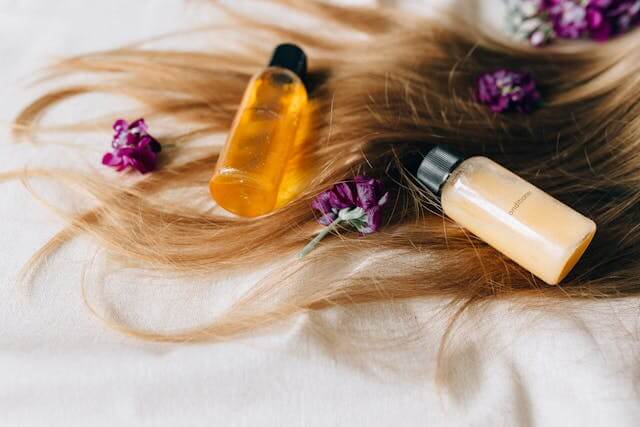
Hair care products are a lucrative category for private labeling due to their consistent demand and potential for brand customization. These products cater to a broad audience and offer significant profit margins.
Hair care is a booming market, with consumers increasingly seeking natural and organic options. Products like shampoos, conditioners, and styling creams are staples in many households.
Popular features include being sulfate-free, cruelty-free, and eco-friendly. Demand has risen by 15% year-over-year, with a noticeable shift towards sustainable packaging.
Target audiences range from salon professionals to everyday consumers looking for premium hair care solutions.
MOQ
Most private label manufacturers require a minimum order quantity (MOQ) of around 500 units for hair care products.
Average Price
Purchasing hair care products from manufacturers typically costs between $3 to $5 per unit. This price can vary based on the complexity of the formulation and the packaging options chosen.
Average Selling Price
Hair care products usually retail between $15 to $25 per unit. Premium products with added features or unique ingredients may sell for even higher prices.
Potential Profit Margin
With an average purchasing cost of $4 and an average selling price of $20, the potential profit margin per unit is $16.
3. Fitness Supplements
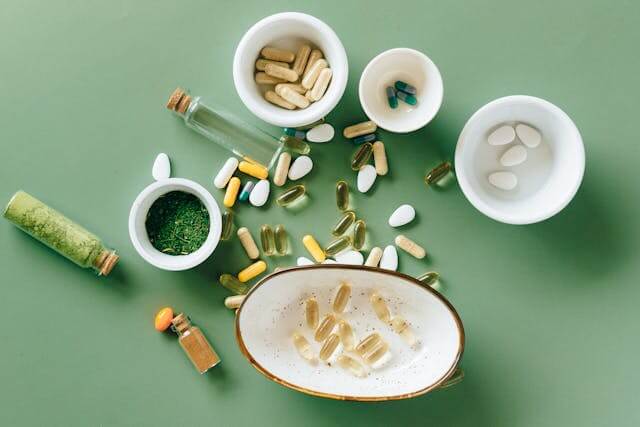
Fitness supplements are in high demand among health-conscious consumers, making them a lucrative choice for private labeling. These products typically come with varied minimum order quantities (MOQs), and potential profit margins can be substantial.
In 2024, the market for fitness supplements continues to grow significantly. An increasing number of consumers are focusing on health and fitness, leading to a higher demand for supplements that enhance performance, recovery, and overall well-being.
Google search data indicates a 20% increase in fitness supplement queries compared to the previous year. Popular features include protein powders, BCAAs (Branched-Chain Amino Acids), pre-workouts, and multivitamins.
Millennials and Gen Z are the primary target audience, driven by lifestyle trends and social media influence.
MOQ
The MOQ for most private label fitness supplements often ranges between 500 to 1,000 units.
Average Price
The average price to purchase fitness supplements from manufacturers can vary depending on the type of supplement.
For instance, the cost to produce a standard protein powder is around $15 per unit. Prices can differ based on ingredients, packaging, and order size, but $15 is a reliable benchmark.
Average Selling Price
The average selling price for a 30-serving container of protein powder is about $45 per unit in retail spaces.
Potential Profit Margin
For a protein powder with an average cost of $15 and an average selling price of $45, the potential profit margin is $30 per unit.
4. Organic Teas
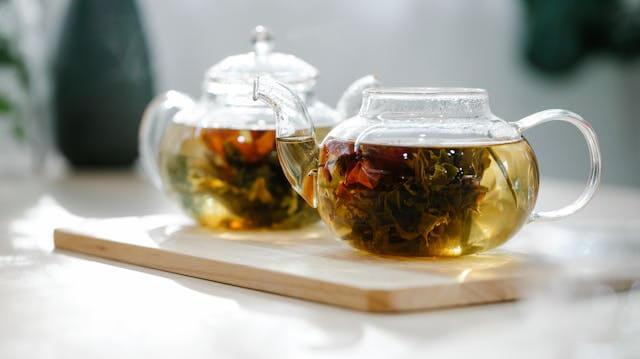
Organic teas have gained immense popularity among health-conscious consumers.
The market for organic teas has seen significant growth as more consumers prioritize health and wellness. Search volumes for organic teas increased by 15% between 2022 and 2024.
Popular types include green, black, herbal, and matcha teas. Organic certification, sustainable sourcing, and unique blends are key features that attract buyers. The target audience includes health enthusiasts, eco-friendly consumers, and gourmet tea lovers.
MOQ
Manufacturers typically require a minimum order quantity (MOQ) of about 50 pounds for private label organic teas.
Average Price
Purchasing organic tea in bulk from manufacturers can cost around $20 per pound. This cost may vary depending on the type and blend of the tea. For instance, rare teas like matcha might be priced higher.
Average Selling Price
The average retail price for organic tea is approximately $45 per pound. This includes standard varieties of organic teas available in specialty tea shops and online stores.
Potential Profit Margin
With an average purchase cost of $20 per pound and an average selling price of $45 per pound, the potential profit margin for selling organic teas is $25 per pound.
5. Essential Oils
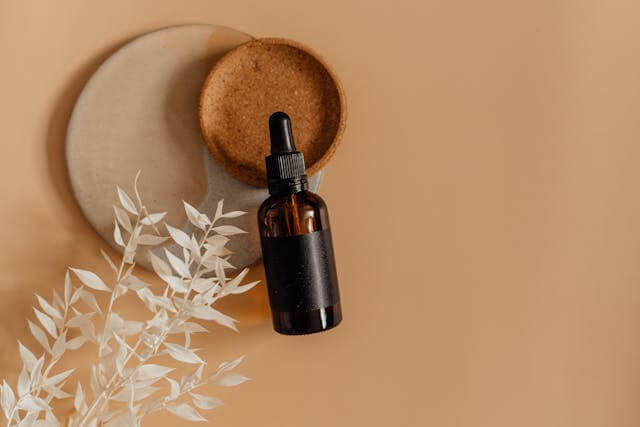
Essential oils are a popular choice for private labeling due to their wide range of uses and growing market demand.
The essential oils market has seen a remarkable rise in consumer demand in 2024. This surge is driven by increasing awareness of natural remedies and wellness products.
According to recent data, search volumes for “essential oils” have increased by 30% over the last year.
Target audiences include wellness enthusiasts, aromatherapy practitioners, and those seeking natural health alternatives. Popular features are therapeutic benefits, purity, and organic labeling.
MOQ
Typical Minimum Order Quantities (MOQ) for private label essential oils vary by manufacturer but usually start at around 500 units.
Average Price
The average cost to purchase essential oils from manufacturers is approximately $3.50 per unit. Prices may vary based on the type of essential oil and its purity.
Average Selling Price
The average retail price for essential oils is $15.00 per unit. This price is often influenced by the brand’s reputation, the oil’s quality, and packaging.
Potential Profit Margin
Given the average purchase price of $3.50 and a selling price of $15.00, the potential profit margin per unit is $11.50.
6. Eco-Friendly Cleaning Products
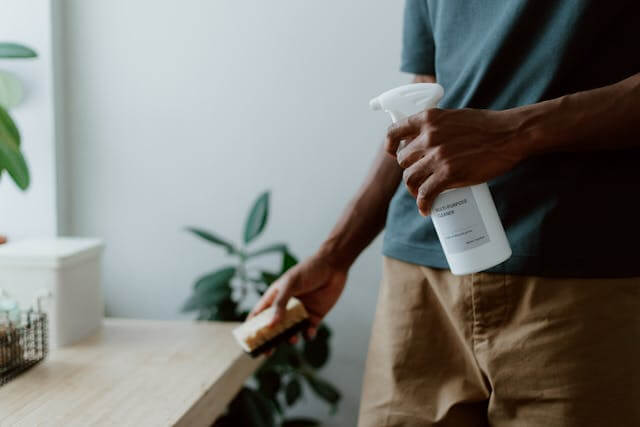
Eco-friendly cleaning products are gaining significant popularity due to increasing environmental awareness and consumer demand for sustainable options. These products offer small businesses a lucrative opportunity to tap into a growing market.
In 2024, eco-friendly cleaning products have seen a surge in demand as consumers prioritize sustainability. According to market research reports, these products have experienced a 35% increase in search volume over the past year.
Consumers seek out products free from harmful chemicals and made with natural ingredients. Key target audiences include environmentally conscious families and businesses aiming to reduce their ecological footprint.
Popular features include biodegradable packaging, non-toxic formulas, and certifications like USDA Organic.
By offering such products under your private label, you can cater to a dedicated and expanding market while promoting your brand’s commitment to sustainability.
MOQ
Manufacturers of eco-friendly cleaning products typically require a Minimum Order Quantity (MOQ) of 500 to 1,000 units.
Average Price
The average cost of purchasing eco-friendly cleaning products from manufacturers ranges between $3 and $5 per unit. Costs may vary depending on the specific product type, complexity of the formula, and any additional certifications required.
Average Selling Price
In the retail market, eco-friendly cleaning products generally sell for an average price of $10 per unit.
Potential Profit Margin
Considering an average purchase cost of $4 and a retail selling price of $10, the potential profit margin for eco-friendly cleaning products stands at $6 per unit.
7. Custom Apparel
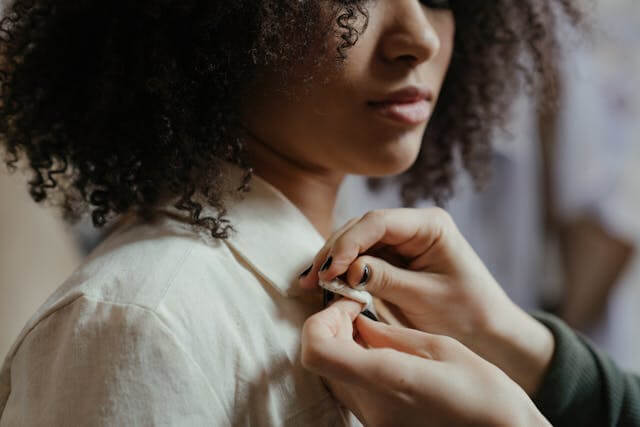
Custom apparel is a great option for private labeling, offering flexibility in design and a strong market presence.
Custom apparel is booming in 2024, driven by consumer demand for personalized and unique clothing items. Apparel brands that offer customization options see increased customer loyalty and higher engagement.
The market has grown significantly, with a 35% increase in search volume compared to last year. Customers are particularly interested in features like eco-friendly materials and ethical manufacturing.
Target audiences include fashion-forward millennials, eco-conscious consumers, and niche markets such as sports teams and corporate clients. Customizing logos, slogans, and designs makes these products stand out.
MOQ
The minimum order quantities (MOQ) for custom apparel can vary widely depending on the manufacturer and type of clothing item. Typical MOQs for t-shirts or hoodies range from 50 to 100 pieces per design and color.
Average Price
The average cost of purchasing custom apparel from manufacturers varies based on factors like design complexity and fabric choice. For a standard custom t-shirt, prices typically range from $5 to $10 per unit.
Higher-end items like custom hoodies or jackets may cost between $20 to $30 each.
Average Selling Price
Due to their personalized nature, custom apparel is often sold at a premium. Expect to sell a custom T-shirt for around $20 to $30 each. Hoodies and jackets generally retail between $50 and $80.
Potential Profit Margin
To determine potential profit margins, compare the cost of production with the selling price. For instance, if you purchase custom t-shirts at $8 each and sell them for $25, your potential profit margin is $17 per unit.
For higher-end items like hoodies purchased at $25 and sold for $65, the profit margin stands at $40.
8. Pet Care Products
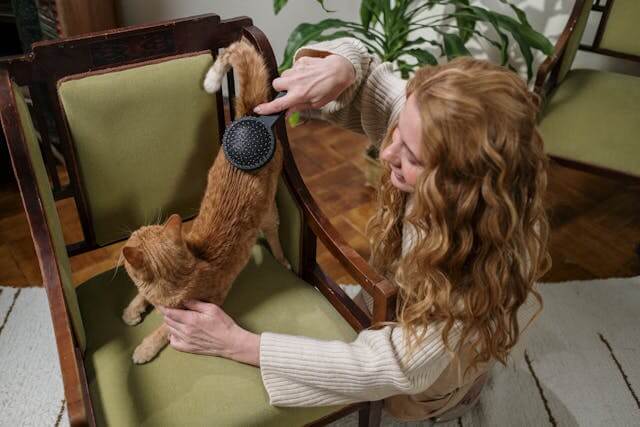
Private label pet care products offer significant opportunities for small businesses due to rising consumer demand and diverse market trends. From grooming supplies to specialized cleaners, pet products show strong profit potential and wide market reach.
Pet care products are booming, driven by increased pet ownership and the humanization of pets. Consumers are looking for premium, organic, and specialized items for their furry friends.
Products like shampoos, conditioners, and odor neutralizers are in high demand. According to market research, there’s been a 15% increase in search volume for pet grooming products over the last year.
Key target audiences include pet owners who prioritize natural ingredients and effective pet care solutions. Popular features often include cruelty-free, eco-friendly, and hypoallergenic qualities.
MOQ
For private label pet grooming items, the typical MOQ ranges from 500 to 1,000 units.
Average Price
The average cost of private label pet care products varies based on the formulation and packaging.
Generally, you can expect to pay between $3.00 and $5.00 per unit for items like shampoos and conditioners.
Organic and specialized products may be priced slightly higher.
Average Selling Price
Retail prices for private label pet care items like shampoos and conditioners generally range from $10.00 to $20.00 per unit. Brands that emphasize premium ingredients or unique features can command prices at the higher end of this spectrum.
Potential Profit Margin
If you purchase a product at $4.00 per unit and sell it at $15.00, your profit margin is $11.00 per unit.
9. Phone Accessories
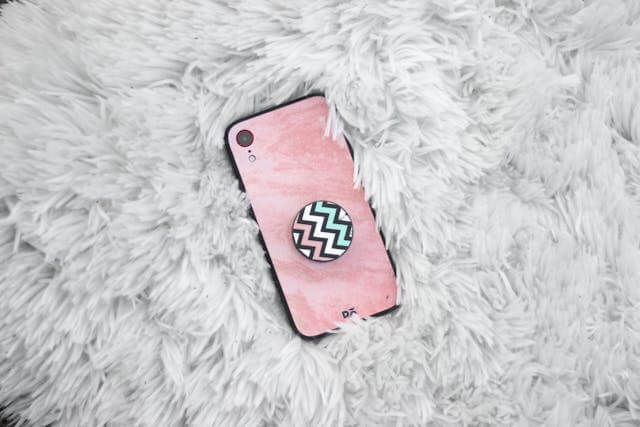
Phone accessories are a high-demand market with consistent consumer interest, offering various opportunities for private labeling. Items like phone cases and chargers are sought after due to their high utility and frequent need for replacements.
Phone accessories like cases, chargers, and screen protectors have seen a significant surge in popularity, driven by the growing smartphone user base.
The global mobile phone accessories market is projected to reach $187 billion by 2029, reflecting its strong growth potential.
Consumers prioritize features such as durability, aesthetic appeal, and innovative designs. Popular trends include eco-friendly materials and multifunctional capabilities.
Private labeling phone accessories enables you to tap into diverse customer preferences and substantial market demand.
MOQ
Manufacturers for phone accessories typically require a Minimum Order Quantity (MOQ) ranging from 100 to 500 units.
Average Price
Purchasing phone accessories such as cases, chargers, or screen protectors from manufacturers usually costs between $2 and $5 per unit. This cost can vary based on customization options and material quality.
Average Selling Price
In retail, phone accessories generally sell for $10 to $30 per unit. Premium and branded accessories can command even higher prices.
Potential Profit Margin
By comparing the average purchase cost of $2 to $5 with the selling price of $10 to $30, the potential profit margin ranges between $5 and $28 per unit.
10. Baby Products
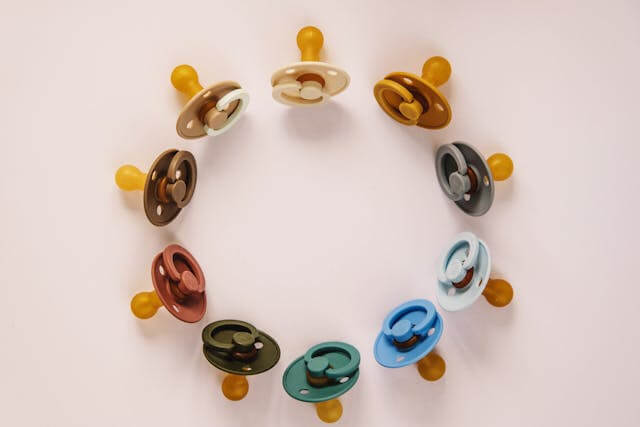
Baby products are essential for families and offer a lucrative opportunity for private labeling. They are consistently in demand, as new parents seek reliable and high-quality items for their children.
Baby products are always in demand due to the constant need for essentials such as diapers, wipes, and baby care items.
This market is growing significantly, with an estimated growth rate of 6% annually. Increasing consumer awareness and willingness to spend on premium products further drive this trend.
Parents often look for safe, hypoallergenic, and eco-friendly products. Items like organic baby food, gentle shampoos, and biodegradable diapers are becoming popular.
This market’s target audience includes new parents, caregivers, and gift buyers looking for high-quality baby products.
MOQ
The minimum order quantity (MOQ) for baby products varies. Diapers typically have an MOQ of 5,000 units. Baby skincare items like shampoos and lotions might have an MOQ of 1,000 units.
Average Price
Diapers might cost around $0.10 per unit at the manufacturing stage. Baby lotions and shampoos often cost around $2.50 per 8 oz bottle.
Average Selling Price
Diapers often sell for around $0.25 per unit. Baby shampoos and lotions typically retail at $8.00 per 8-oz bottle. Premium and organic products might be priced even higher, depending on market demand.
Potential Profit Margin
Calculating the potential profit margin helps you understand the product’s profitability.
For instance, with diapers purchased at $0.10 and sold at $0.25, the potential profit margin is $0.15 per unit. For baby shampoos costing $2.50 and selling at $8.00, the margin stands at $5.50 per unit.
11. Coffee
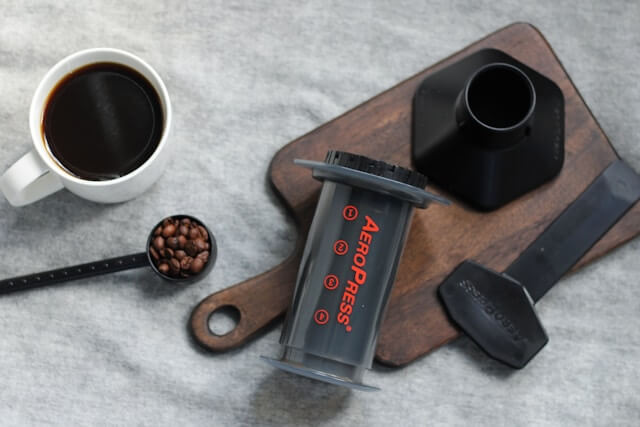
Coffee is a popular private label product due to its high demand, versatility, and potential for customization. Small businesses can capitalize on this by sourcing high-quality beans and offering unique blends.
The coffee market is thriving, with consumer demand for specialty and gourmet coffee increasing. In 2024, the global coffee market is expected to grow by 10%.
Consumers seek unique flavors, organic options, and sustainable practices. Popular trends include single-origin coffees and eco-friendly packaging.
Target audiences include coffee enthusiasts, eco-conscious consumers, and those seeking premium products. Notable features are unique roast profiles, fair trade certification, and innovative packaging.
Specialty coffee is particularly appealing due to its high perceived value.
MOQ
For smaller businesses, some providers offer a low MOQ of 22 pounds. Others may require a minimum of one pallet, approximately 672 bags.
Average Price
The average cost of purchasing private label coffee from manufacturers can vary based on quality and quantity. Typically, purchasing in larger quantities reduces cost. For reference:
- Basic blends: $8 per pound.
- Specialty blends: $12 per pound.
- Premium options: $15 per pound.
Average Selling Price
Retail prices for private label coffee also vary according to the blend’s quality and packaging. On average, you can expect:
- Basic blends: $12 per pound.
- Specialty blends: $18 per pound.
- Premium options: $25 per pound.
Potential Profit Margin
Comparing the average cost to the average selling price reveals potential profit margins:
- Basic blends: Cost $8, Selling $12, Profit $4.
- Specialty blends: Cost $12, Selling $18, Profit $6.
- Premium options: Cost $15, Selling $25, Profit $10.
12. Kitchenware
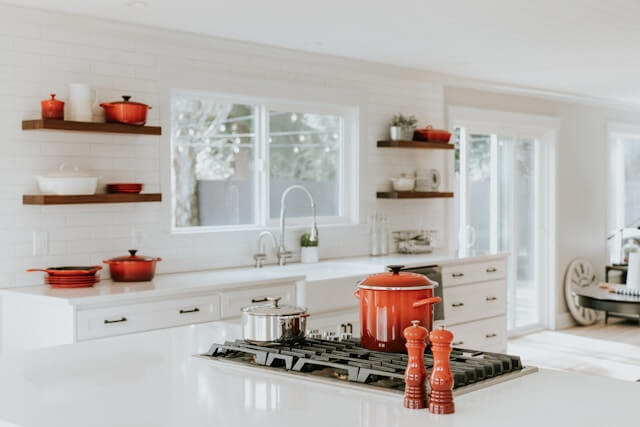
Kitchenware consistently ranks high among private label products due to its continuous market demand and versatility.
Private label kitchenware includes items like cookware, bakeware, and utensils. The market for these products has been growing steadily, reflecting a 15% increase in search volumes year-over-year.
This growth is driven by consumers’ desire for unique, high-quality kitchen tools.
Popular features include ergonomic designs and durable materials. Target audiences range from home cooks to professional chefs.
MOQ
Manufacturers typically require a MOQ ranging from 500 to 1,000 units for kitchenware.
Average Price
The average cost of purchasing private label kitchenware from manufacturers varies. Generally, cookware items cost around $15 per unit.
Utensils can range from $3 to $5 per piece, and bakeware usually falls between $7 and $12 per item.
Average Selling Price
Private label kitchenware items are typically sold at higher retail prices. Cookware sets can sell for about $50 to $70.
Individual bakeware items retail around $20 to $30, and utensils are priced between $8 and $15.
Potential Profit Margin
The potential profit margin for kitchenware is substantial. For instance, purchasing cookware at $15 per unit and selling at $60 allows for a $45 profit per sale.
Similarly, buying utensils at $4 each and retailing them for $10 provides a $6 profit. Bakeware bought for $10 and sold for $25 offers a $15 profit.
13. Home Decor
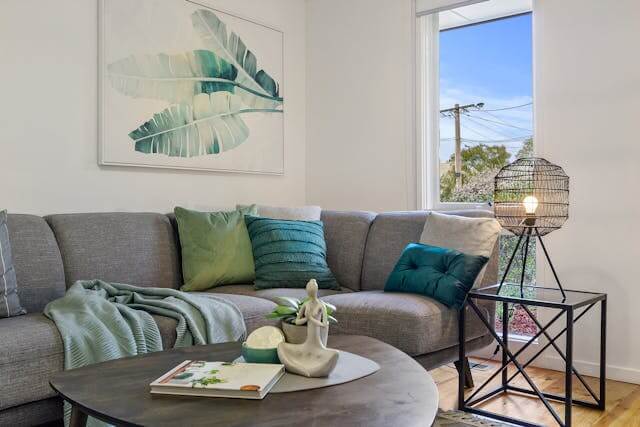
Home decor products are increasingly popular for private labeling due to high consumer demand and their flexibility in design and theming.
The home decor market has seen a significant rise in demand in recent years. Items like carpets, wall art, and decorative accessories are particularly sought after.
Consumers show a strong preference for unique and personalized pieces. Seasonal trends, sustainability, and handmade or artisanal features are growing in popularity.
The global home decor market is expected to grow continuously, making it a lucrative sector for private labeling.
Products sourced from European manufacturers are especially popular due to their perceived quality and design.
MOQ
The MOQ can range from 50 to 200 pieces depending on the product type and complexity.
Average Price
Carpets may cost around $30 each, while smaller decorative items could range from $5 to $15 per piece.
Average Selling Price
Carpets can sell for around $80 to $200 depending on their size and quality. Smaller decorative items, like wall art or vases, typically sell for $20 to $50 each.
Potential Profit Margin
The potential profit margin for home decor products can be substantial. For instance, a carpet bought at $30 and sold at $100 yields a profit margin of $70. Smaller items, such as a vase bought at $10 and sold at $30, offer a margin of $20.
14. Toys
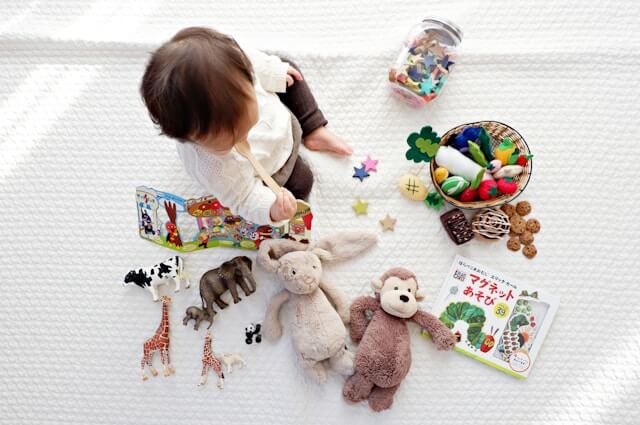
The toy market continuously thrives, driven by parents and gift-givers who prioritize children’s entertainment and education. For example, educational toys and STEM kits are gaining immense popularity.
In 2024, products like sensory toys have seen a search volume increase of 20% from the previous year. Key demographics include parents with children aged 3-10. Popular features include durability, educational value, and safety.
Furthermore, custom toys tailored to current trends, such as eco-friendly wooden toys, can attract a broader audience. Increased demand for unique toys makes this category ideal for private labeling.
MOQ
The minimum order quantities for manufacturing private label toys generally range from 500 to 1,000 units.
Average Price
The average cost of sourcing private label toys directly from manufacturers is around $2 to $10 per unit. This price range varies based on the material, complexity, and custom features of the toys.
Average Selling Price
Retail prices for private label toys typically range from $10 to $50 per item. This wide margin encompasses basic items such as simple action figures to more advanced, educational toys.
For instance, you can sell a basic toy car set for $10, whereas a more intricate educational STEM toy set might go for $50.
Potential Profit Margin
The potential profit margin for private label toys usually sits between $8 to $40 per item, depending on production costs and retail pricing. For an item sourced at $5 and sold at $25, the profit margin stands at $20.
15. Backpacks

Backpacks are versatile and widely used products with strong market demand. Backpacks enjoy consistent popularity across various demographics, from students to professionals and travelers.
Recent market trends show an increasing interest in eco-friendly and ergonomic designs. Searches for backpacks have surged, with keywords like “backpacks for school” and “travel backpacks” seeing significant increases in search volume.
MOQ
The Minimum Order Quantities (MOQ) for private label backpack manufacturers typically range from 100 to 500 units.
Average Price
The cost to manufacture a private label backpack usually falls between $1 to $15 per unit. This range varies based on materials, design complexity, and additional features such as padded straps or waterproofing.
Average Selling Price
Private label backpacks typically sell at retail prices ranging from $14 to $200, depending on the brand positioning and target market.
Potential Profit Margin
If the cost per unit is $10 and the selling price is $60, the profit margin is $50 per unit.
16. Craft Supplies
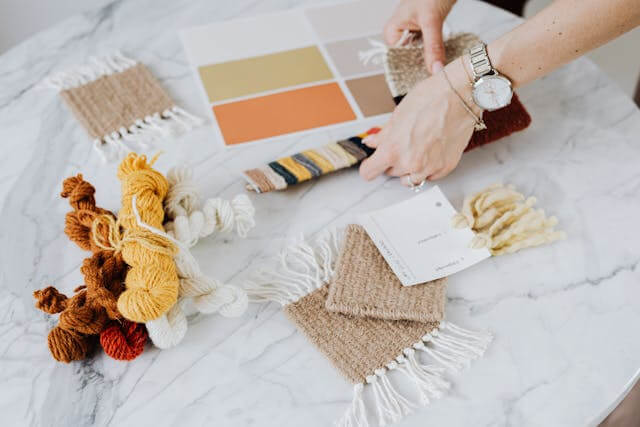
The market for craft supplies has seen significant growth. With the DIY culture growing, consumers are looking for unique and quality products.
In 2023, the search volume for craft supplies grew by 25%. Popular items include acrylic paints, knitting yarn, and scrapbooking materials. This segment attracts hobbyists, educators, and parents.
Features like vibrant colors and eco-friendliness add to their appeal. According to a market research report, the global craft supplies market is expected to reach $50 billion by 2025.
MOQ
Manufacturers typically set a minimum order quantity (MOQ) for craft supplies at around 500 units.
Average Price
The average manufacturing cost for craft supplies varies based on the type of product. For instance, a set of acrylic paints might cost around $3.00. Knitting yarn could be around $1.50 per skein.
Average Selling Price
The average retail price for craft supplies reflects their type and quality. A set of acrylic paints is typically sold for $10.00. Knitting yarn averages around $5.00 per skein in retail shops.
Potential Profit Margin
For acrylic paints, if the manufacturing cost is $3.00 and the selling price is $10.00, the potential profit margin is $7.00. For knitting yarn, with a manufacturing cost of $1.50 and a selling price of $5.00, the margin is $3.50.
17. Water Bottles
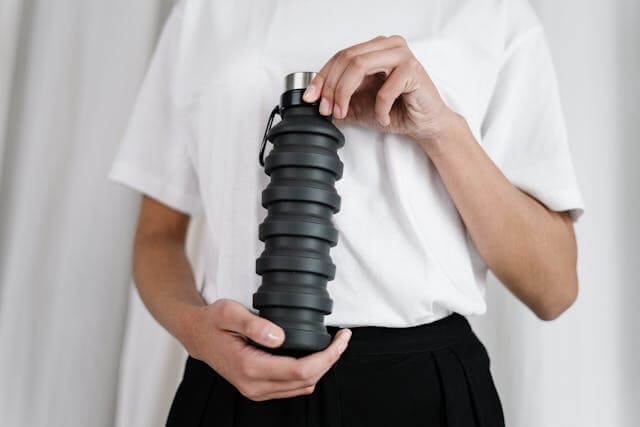
Private label water bottles can be a lucrative product offering for small businesses due to increased consumer demand for sustainable and customizable bottled water options.
The demand for private label water bottles has seen a sharp increase. Consumers prefer personalized products, and businesses can add their logos and branding.
Data from 2023 shows a 20% rise in search volume for private label water bottles. These bottles are often used in fitness centers, auto dealerships, and promotional events. Sustainable packaging and BPA-free materials are popular features.
MOQ
Manufacturers typically require an MOQ that ranges from 500 to 1,000 units.
Average Price
The cost of purchasing private label water bottles varies, but it usually falls between 0.50 to 1.00 USD per bottle.
Average Selling Price
Private label water bottles are sold at an average retail price of 2.00 to 3.00 USD per bottle.
Potential Profit Margin
The potential profit margin for private label water bottles is substantial, calculated as follows:
- Average Cost: 0.50 to 1.00 USD per bottle
- Average Selling Price: 2.00 to 3.00 USD per bottle
By subtracting the average cost from the selling price, the potential profit margin ranges from 1.00 to 2.50 USD per bottle.
18. Bath Bombs
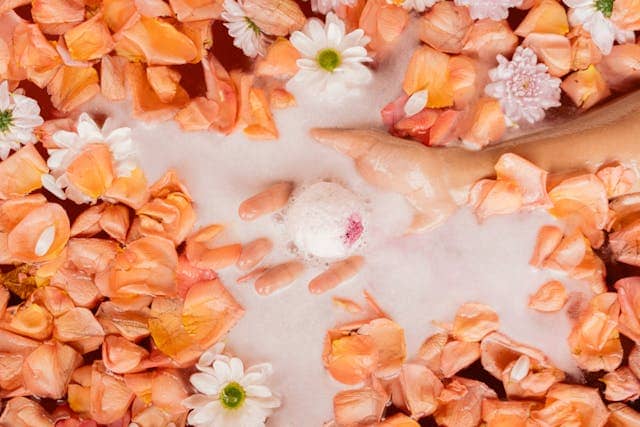
Bath bombs are a popular choice among consumers looking for relaxation and self-pampering. Their soothing properties and vibrant colors make them a great private label product.
In 2024, searches for bath bombs have increased by 25% compared to previous years. Consumers are particularly attracted to natural ingredients and unique scents.
Key target audiences include women aged 18-34 and gift shoppers. Popular features are skin-nourishing ingredients, aromatherapy benefits, and fun shapes or themes.
MOQ
For small businesses, the typical MOQ ranges from 500 to 1,000 units.
Average Price
When sourcing bath bombs from manufacturers, the average cost is $1.50 to $2.50 per unit. Premium options with organic or specialty ingredients can be more expensive.
Average Selling Price
The retail price for bath bombs generally falls between $5.00 and $8.00 per unit.
Potential Profit Margin
The potential profit margin for bath bombs can be calculated by comparing the average cost and selling price. If a manufacturer charges $2.00 per unit and you sell each for $6.00, the profit margin is $4.00 per unit.
19. Reusable Bags
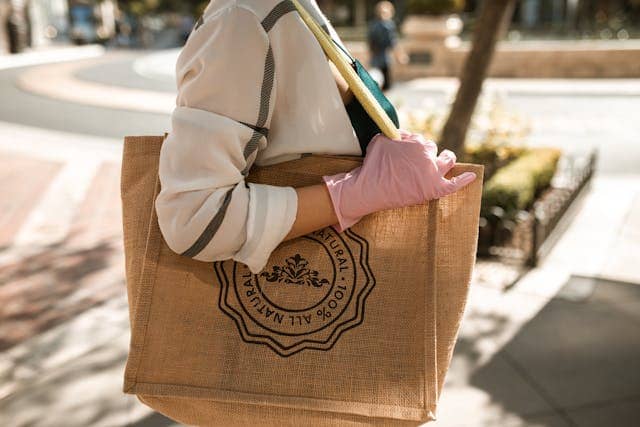
Reusable bags are an eco-friendly alternative to disposable bags, making them a popular choice among environmentally conscious consumers.
These products appeal to a wide audience and offer excellent potential for private labeling, offering customization options that align with various brands.
The market for reusable bags is growing rapidly as more consumers shift towards sustainable lifestyles. In 2024, this trend has seen a significant rise, with a 20% increase in search volume compared to last year.
These bags are used for groceries, daily essentials, and even as promotional merchandise. They often feature durable materials such as jute, cotton, or canvas. Popular features include reinforced stitching, ergonomic handles, and customizable prints.
Target audiences include eco-conscious individuals, grocery shoppers, and businesses looking for promotional items. Additionally, customizable aspects such as size, color, and design make these bags versatile and appealing.
MOQ
For custom designs, this number usually starts at around 500 units.
Average Price
The average cost of purchasing reusable bags from manufacturers is typically around $2.50 per unit.
Average Selling Price
The average retail price at which reusable bags are sold is approximately $10 per unit.
Potential Profit Margin
With an average manufacturing cost of $2.50 and a selling price of $10, the potential profit margin is $7.50 per bag.
20. Candle Making Kits
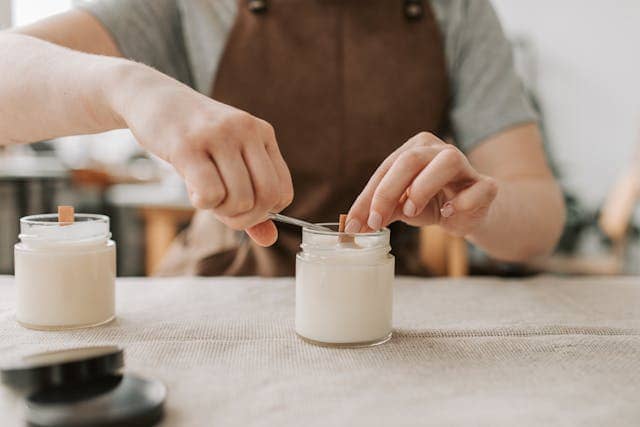
Candle making kits are popular for both hobbyists and small businesses. They offer a creative outlet and an opportunity to produce personalized, high-quality products.
There has been a noticeable rise in DIY hobbies, with candle making seeing a 30% increase in search volume over the past year. Consumers appreciate the ability to customize fragrances and designs, making candle kits appealing to a wide audience.
Target audiences include craft enthusiasts, small business owners, and gift shoppers. Popular features in these kits are eco-friendly materials, diverse fragrance options, and stylish packaging.
MOQ
Typically, manufacturers require a minimum order quantity (MOQ) of around 50 to 100 kits.
Average Price
The average cost of purchasing candle making kits from manufacturers is $15 per kit. This price point includes basic materials such as wax, wicks, fragrance oils, and containers.
Average Selling Price
On the retail market, candle making kits are generally sold at an average price of $35 per kit.
Potential Profit Margin
By comparing the costs, the potential profit margin for candle making kits is $20 per kit.
21. Plant-Based Protein Powders
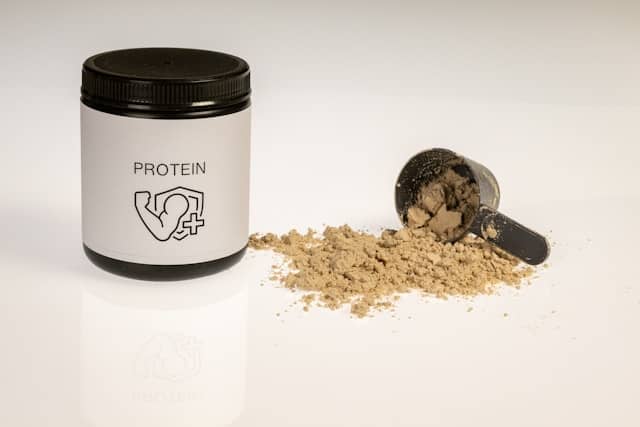
Plant-based protein powders are increasingly popular due to rising health and environmental consciousness. They cater to diverse dietary restrictions and offer a viable alternative to traditional whey proteins.
The market for plant-based protein powders has witnessed a significant surge.
According to a recent report by Grand View Research, the global plant-based protein supplements market is estimated to grow up to USD 4.62 billion by 2030.
Consumers are seeking dairy-free, vegan, and eco-friendly options, making plant-based proteins an attractive product.
Search volumes for vegan protein options have increased by 35% compared to the previous year. Popular sources include peas, rice, and hemp, which are rich in essential amino acids.
These products appeal most to fitness enthusiasts, vegans, and individuals with lactose intolerance.
MOQ
Common MOQs range from 500 to 1,000 units per flavor variety.
Average Price
Typically, these products cost between $10 and $15 per unit for bulk orders.
Average Selling Price
Retail prices for plant-based protein powders generally range from $25 to $40 per unit.
Potential Profit Margin
If the average cost is $12.50 and the selling price is $32.50, the potential profit margin is $20 per unit.
FAQs about Private Label Products for Small Business
Private label products offer a way to build brand identity and increase profits with unique products. Understanding the process, costs, and strategies is essential for success.
How Do I Find Products to Private Label?
Research.
Private label products are not always products that consumers have never seen before. On the contrary, most of them are very ordinary products.
The secret is to identify products that consumers need or like and customize them to make them unique.
This entices customers to try out your brand of products because, while they have used that product before, your version of it has something that other brands don’t.
So, how do you identify popular products or unique ways to customize them? By researching your target market and your competitors’ products. This will help you notice any unmet needs or expectations in the market that you can fulfill.
How Do I Private Label Products?
There are 2 approaches to private labeling. So, for illustration, let us assume that you would like to private label grilling sets. Here is how both approaches would work.
In the first approach, you would:
- Identify grilling sets as the products that you would like to sell.
- Find a private label grilling sets manufacturer.
- Evaluate the designs that they have in a catalog or in stock.
- Customize the grilling set designs to your liking. This may include changes such as color, packaging, or the type of tools in the set.
- The manufacturer would then customize your grilling sets based on your instructions and brand them with your brand name and logo.
Alternatively, you could:
- Identify grilling sets as the right items to private label.
- Develop a custom design of grilling tools for your brand. This can be done on your own or with the help of a hired designer or the design team at your chosen manufacturing factory.
- The custom design is then perfected, assigned materials, and sampled.
- If you approve the sample, the manufacturer proceeds to manufacture the number of grilling sets that you order and brands them with your brand name and logo.
The difference between these approaches is that in the first, you only customize the manufacturer’s design while in the second, you develop an original design. These approaches are also known as ODM and OEM, respectively.
How Much Does Private Labeling Cost?
There is no standard cost of private labeling. This is because different products cost different amounts to manufacture, and manufacturers charge different rates for their services.
However, as you consider private labeling, it is important to take note of factors that may impact your costs. They include:
- The location – it costs more to manufacture products in some countries than in others. China, for instance, has favorable taxation policies on manufacturing and good infrastructure. Both factors allow lower costs of production compared to the USA or Europe.
- The complexity of the design – complex product designs or customizations require more skill and often take longer to achieve than simple designs. Manufacturers, therefore, charge more for such designs.
- Your choice of materials – premium materials cost more and may sometimes have to be sourced from specific suppliers. Manufacturers then pass on these extra costs to you by increasing the per-unit cost of producing your private label products.
- The quantity – producing small quantities of goods typically costs more than manufacturing in bulk. Subsequently, manufacturers set MOQs at which they can offer you wholesale rates. Any orders below that are charged a higher price.
- Additional services – branding, decorations, and custom packaging are, in most cases, considered extra services. You would thus incur extra costs for them apart from the primary manufacturing costs.
How Do I Make Money with Private Label Products?
Earning good profit margins from private label products can be tricky because you bear most of the risk. However, with the right tips, it can be smooth sailing for your brand. Make an effort to:
- Differentiate your product and brand – use private labeling to set yourself apart from your competitors. Customers will be willing to pay more for your products if they feel that your brand is special. If not, you will have to sell at the market rate.
- Keep production costs low – low production costs allow you to sell at a high profit margin while keeping your products affordable to customers. It is a win-win for all.
- Market your goods – start marketing your products before launching them and keep at it even after. More importantly, focus on marketing strategies that are relatable to your customers and highlight the features of your products.
- Explore alternative business models – sometimes selling your private label goods through brick-and-mortar retail or online stores can eat into your profits. If so, it may be advisable to consider options such as dropshipping order fulfillment.
What Are the Most Successful Private Label Brands?
Several brands have achieved success with private label strategies. For example, Kirkland Signature from Costco is known for its quality and competitive pricing.
Trader Joe’s offers unique products that align with their brand identity. High-quality production, effective marketing strategy, and strong branding are key factors in their success.
Closing Insights: Building Your Brand with Private Label Products for Small Business
Starting a private label business offers you a unique opportunity to create and sell branded products. By sourcing quality items, you can establish a product line that stands out.
Selling private label products allows for greater control over pricing and branding. This can increase your profit margins and build customer loyalty.
Using reliable product sourcing services, you can avoid the hassle of dealing with unreliable suppliers. Select unique products to differentiate your brand.
Invest in professional product branding to enhance your visibility in a crowded market. Custom packaging can further set your brand apart and provide a memorable unboxing experience.
Ready to build your brand? Reach out for a free quote to bring your vision to life with high-quality products. Start your journey toward launching a successful private label product line today.
